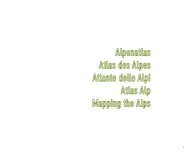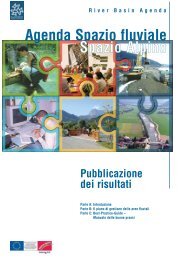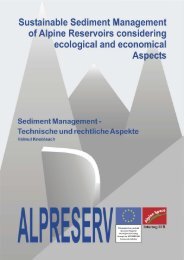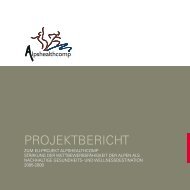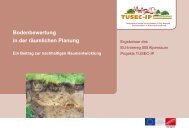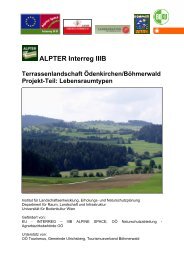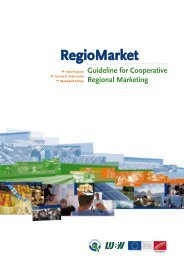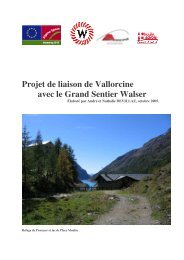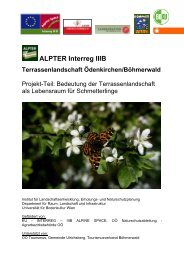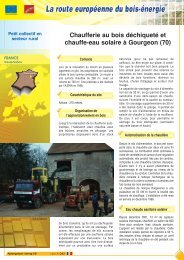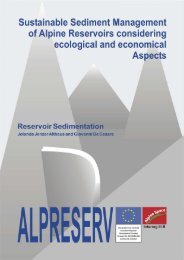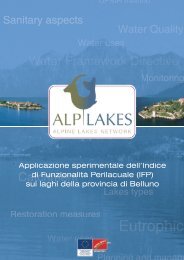1.2 - INTERREG IIIB Alpine Space Programme
1.2 - INTERREG IIIB Alpine Space Programme
1.2 - INTERREG IIIB Alpine Space Programme
You also want an ePaper? Increase the reach of your titles
YUMPU automatically turns print PDFs into web optimized ePapers that Google loves.
Aim<br />
MARS 1.1<br />
Monitoring the <strong>Alpine</strong> Regions’ Sustainability<br />
Monitoring sustainable development of the <strong>Alpine</strong> <strong>Space</strong> and its regions with appropriate indicators and comparative data.<br />
Sustainable development can not be reached without taking<br />
all three mutually interactive dimensions (economy, ecology,<br />
social dimension) into account. However, currently no coherent<br />
data set for all <strong>Alpine</strong> regions for such a monitoring<br />
of sustainability is available. Therefore the main aim of the<br />
project was to elaborate a database with appropriate indicators,<br />
comparative data for every region and appropriate methods<br />
of aggregation and integration for monitoring sustainable<br />
development of the regions of the <strong>Alpine</strong> <strong>Space</strong>. With the establishment<br />
of such a monitoring system and the communication<br />
to the public, people and stakeholders should be better<br />
sensitised to the problems of sustainable development and<br />
the interrelations between the economic, ecologic and social<br />
developments in their territory. Based on these data, a report<br />
on the <strong>Alpine</strong> sustainability situation was elaborated and political<br />
recommendations for actions should possibly be derived<br />
on the basis of the project results.<br />
Activities<br />
In general, a common evaluation of the sustainable development<br />
in different regions is very difficult because of varying<br />
opinions on the definition of sustainable development and on<br />
how to quantify the three dimensions. Each Region usually<br />
collects its own set of data, outside the context of sustainability<br />
and often following different standards and methods.<br />
To come to one joint “<strong>Alpine</strong> Sustainability Indicator Set”, appropriateness<br />
and availability of data from all <strong>Alpine</strong> regions<br />
had to be explored, joint standards to be agreed upon and<br />
coherent methods to aggregate existing data had to be elaborated.<br />
Finally a joint methodology how to assess the state of<br />
sustainability by means of these data had to be agreed upon.<br />
All the methodology had finally to undergo a “cross check”<br />
as a report on the current state of sustainability in the <strong>Alpine</strong><br />
regions was produced, relying on the project data and comparing<br />
the state of sustainability in the <strong>Alpine</strong> regions by a<br />
benchmarking methodology.<br />
Outcomes and results<br />
A quite broad data base for the monitoring of sustainable<br />
development was finally elaborated from which several statements<br />
on sustainable development of the <strong>Alpine</strong> regions can<br />
be given. Especially in the economic field data quality is quite<br />
high, which is no surprise due to the already highly harmonised<br />
standards and methods on indicators in this field.<br />
Within the field of social indicators, the database should be<br />
further developed. Especially for the so-called “soft facts” (as<br />
social capital, etc.) a common understanding is missing and<br />
the collection of data should be enhanced.<br />
As to the ecological dimension a fundamentally innovative approach<br />
was chosen. The focus was put on pressures on the<br />
environment through societal activities in order to make the<br />
link between environment and society more visible. Together<br />
with existing data on the state of the environment a comprehensive<br />
picture can be derived in the future.<br />
With the help of the established database first statements on<br />
sustainable development of the regions of the <strong>Alpine</strong> <strong>Space</strong><br />
can be derived. One further necessary step is to analyse the<br />
outcomes achieved so far more in detail e.g. through the clustering<br />
of similar regions and illumination of the explicit background<br />
of the different regions.<br />
The report has been taken up by the regional administrations<br />
that were partners within the project and its conclusions can<br />
serve as inputs for the future elaboration of regional development<br />
strategies. Moreover the data base created new knowledge<br />
about the <strong>Alpine</strong> <strong>Space</strong> in the important field of sustainable<br />
development and can serve as an excellent source e.g.<br />
for the elaboration of the future EU-Territorial Cooperation<br />
<strong>Programme</strong> “<strong>Alpine</strong> <strong>Space</strong>”.<br />
CH<br />
A<br />
A<br />
A<br />
A<br />
A<br />
A<br />
D<br />
A<br />
F<br />
I<br />
I<br />
A<br />
A<br />
A<br />
I<br />
I<br />
I<br />
A<br />
D<br />
SI<br />
Lead partner<br />
Project partner<br />
Lead partner<br />
BAK Basel Economics<br />
ERDF Lead partner:<br />
Bundeskanzleramt<br />
Other partners<br />
Land Burgenland<br />
Land Kärnten<br />
Land Salzburg<br />
Land Tirol<br />
Land Vorarlberg<br />
Bayer. Landesamt UW<br />
BMLFUW<br />
Région Alsace<br />
Regione Veneto<br />
ARPA Bolzano<br />
Oberöst. Akademie<br />
Oberöst. TMG<br />
ÖL Steiermark<br />
Provincia A. di Trento<br />
Regione Liguria<br />
Regine Piemonte<br />
Stadt Wien<br />
Wirtschaft BaWü<br />
MOP<br />
Project website<br />
www.bakbasel.com/wEnglisch/benchmarking/interreg/<br />
indexW3DnavidW26105.shtml<br />
Contact person<br />
BAK Basel, CH, Thomas Schoder<br />
Tel +41 (0)61 279 97 16<br />
Fax +41 (0)61 279 97 28<br />
schoder@bakbasel.com<br />
Bundeskanzerlamt, A, Michael Roth<br />
Tel +43 (0)1 53115 2936<br />
Fax +43 (0)1 53115 2180<br />
michael.roth@bka.gv.at<br />
Duration<br />
05.2003 – 06.2005<br />
Total budget in EUR<br />
1.347.300<br />
ERDF in EUR<br />
308.374<br />
19<br />
spatial planning & competitiveness



